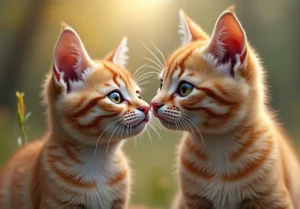Cats are known for their predatory behavior, and one of the most common victims of their hunting instinct is the mouse. But why do cats attack mice? Let’s explore the reasons behind this natural feline behavior.
Cats attacking mice is a result of their natural hunting instincts. From their ancestral roots to their domestication, cats have always been avid hunters, and mice are often easy prey due to their size and speed. Additionally, cats have a strong predatory drive, honed through years of evolution, that compels them to chase and catch small animals like mice.
Feline Instincts: Understanding the Hunting Behavior
Cats are natural-born hunters, with instincts that drive them to hunt and attack mice. Their keen senses, including sharp vision and acute hearing, allow them to detect even the slightest movements of their prey. Cats also have specialized whiskers that help them navigate and identify potential targets in the dark.
When a cat stalks and pounces on a mouse, it’s not just about the thrill of the chase. Hunting for small prey satisfies their primal urge to hunt and capture food. Even well-fed domestic cats retain this instinct, as it is deeply ingrained in their DNA from their wild ancestors.
An interesting fact to note is that cats use a hunting technique called “stalking-prey-play” when targeting mice. This involves silently approaching their prey, followed by a sudden burst of speed to catch them off guard. This technique showcases the agility and precision that cats possess in their hunting pursuits.
Territorial Nature: Establishing Dominance Through Hunting
Beyond the thrill of the hunt, attacking mice also serves a practical purpose for cats – it helps them mark their territory and establish dominance. By catching prey and leaving their scent behind, cats communicate to other animals in the area that this is their domain.
Territorial marking through hunting is especially important for outdoor cats, who need to defend their territory from other intruders. By hunting and attacking mice, cats assert their dominance and send a clear message that they are the rulers of their domain.
In addition to marking their territory, hunting and attacking mice also provide cats with mental and physical stimulation. It allows them to exercise their natural instincts and keep their hunting skills sharp, contributing to their overall well-being and happiness. A cat’s hunting behaviors are not just about survival but also about fulfilling their innate need to hunt and conquer prey.
Play or Prey? The Fine Line Between Hunting and Entertainment
Cats have an innate hunting instinct that drives them to chase and capture small creatures like mice, not only as a means of survival but also as a form of entertainment. To a cat, a mouse is both prey and a plaything, blurring the line between hunting for food and hunting for fun. When a cat “plays” with a mouse, it mimics the behavior of stalking, pouncing, and swatting that are essential for survival in the wild. This playful behavior serves as both mental and physical stimulation for our feline friends, keeping them sharp, agile, and engaged.
However, it’s crucial to distinguish between cats hunting mice for entertainment and hunting for population control. While it may seem like a cat is simply playing with a mouse, it is ultimately driven by its natural hunting instincts. This behavior is deeply ingrained in cats and is an integral part of who they are as carnivorous predators.
A Natural Pest Control: The Benefits of Cats Hunting Mice
Cats are excellent hunters and serve as a valuable form of natural pest control when it comes to mice. By keeping mouse populations in check, cats help prevent infestations in human households, barns, and other structures where mice can cause damage and spread disease.
Apart from being excellent hunters, cats also possess a keen sense of smell and hearing that allows them to detect mice even before they are visible. This means that cats can effectively keep mice at bay, reducing the risk of a full-blown infestation. Additionally, the presence of cats in an area can act as a deterrent to mice, as these rodents are naturally wary of their feline predators.
By allowing cats to engage in their natural hunting behavior, we not only provide them with mental and physical stimulation but also reap the benefits of a rodent-free environment. So, the next time you see your cat pouncing on a toy mouse, remember that it’s not just play—it’s an essential part of their role as skilled hunters.
Indoor Cats: Do They Still Have the Urge to Attack Mice?
Even though indoor cats may not have the opportunity to hunt live prey like mice, they still retain their natural instinct to chase and attack. Cats are born hunters, and this behavior is deeply ingrained in their DNA. Without the ability to engage in actual hunting, indoor cats may exhibit play hunting behaviors to satisfy their instinctual drive. This could include stalking toys, pouncing on objects, or even chasing shadows.
To help indoor cats fulfill their hunting instincts in a safe and controlled manner, provide interactive toys that mimic prey movements. Toys like feather wands or laser pointers can keep them entertained and mentally stimulated. Additionally, setting up a cat tree or building vertical spaces for your indoor cat to climb and perch can simulate the experience of hunting in the wild.
Remember, even though your indoor cat may not have access to live mice, it’s essential to understand and respect their innate predatory nature.
Training and Socialization: Can Cats Be Taught Not to Attack Mice?
While cats are natural hunters, they can be trained to coexist peacefully with smaller animals like mice. Early socialization plays a crucial role in shaping a cat’s behavior towards other pets in the household. If a cat is introduced to mice or other small animals at a young age, they are more likely to learn to tolerate their presence without feeling the need to hunt them.
Positive reinforcement training techniques can also help discourage cats from attacking mice. Rewarding desired behaviors such as ignoring the mice or showing indifference towards them can help reinforce the idea that hunting them is not appropriate. Consistent training and patience are key in teaching cats to control their instinctual drive to chase and attack.
Remember, each cat is unique, and some may require more time and effort to adjust their behavior towards mice. It’s essential to be patient and understanding during the training process.
Additional Tip : Providing your cat with regular mental and physical stimulation through interactive play and environmental enrichment can help redirect their energy away from hunting small animals like mice.
Cat and Mouse: A Never-Ending Battle
Cats and mice have been locked in a never-ending battle for centuries, with cats being the natural predators of mice. This dynamic relationship between the two animals has been deeply ingrained in folklore, literature, and popular culture. From classic tales like Tom and Jerry to ancient fables warning of the cunning cat, the cat-mouse relationship is a staple in storytelling.
But why do cats attack mice? It all comes down to instinct. Cats are natural hunters, and their predatory instincts drive them to chase and catch small animals like mice. In the wild, cats depend on hunting for survival, and mice make for easy and plentiful prey. Even domesticated cats retain these hunting instincts, which is why they may still exhibit this behavior even when well-fed.
By understanding this natural behavior of cats, we can appreciate the intricate world of feline hunting. It’s not about cruelty or malice; it’s simply in a cat’s nature to hunt. This age-old dynamic between cats and mice highlights the fascinating instincts and behaviors of our feline companions, shedding light on their primal instincts and the delicate balance between predator and prey.
Unique Insight: Cats have specialized sensory receptors called vibrissae, more commonly known as whiskers, that play a crucial role in their hunting abilities. Whiskers help cats navigate and detect subtle movements in their environment, aiding them in stalking and catching their prey with precision.
Reasons Behind Cat-Mouse Hunting Behavior
- Instinctive Nature: Cats are natural-born hunters, and their instinct to hunt small prey like mice is deeply ingrained in their DNA.
- Environmental Factors: In the wild, cats rely on hunting for survival, making mice a common and easily accessible food source.
- Play and Exercise: Hunting behaviors in domestic cats can also serve as a way for them to exercise and fulfill their natural instincts, even if they don’t rely on hunting for food.
- Territorial Behavior: Cats may also catch mice to defend their territory, as they see small animals like mice as potential threats.
- Mouthing and Predator Play: Some cats may catch mice without intending to harm them, using them for mouthing practice or engaging in predator-prey play.
By understanding these reasons behind cat-mouse hunting behavior, we can better comprehend our feline friends’ natural instincts and behaviors, fostering a deeper appreciation for their unique characteristics and the complex relationship between cats and their prey.
Alex, a passionate animal lover, has experience in training and understanding animal behavior. As a proud pet parent to two dogs and three cats, he founded AnimalReport.net to share insights from animal experts and expand his knowledge of the animal kingdom.




